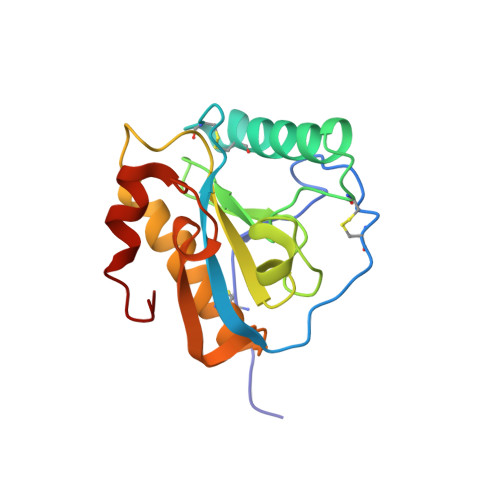Structural insights into the dual strategy of recognition by peptidoglycan recognition protein, PGRP-S: structure of the ternary complex of PGRP-S with lipopolysaccharide and stearic acid.
Sharma, P., Dube, D., Sinha, M., Yadav, S., Kaur, P., Sharma, S., Singh, T.P.(2013) PLoS One 8: e53756-e53756
- PubMed: 23326499
- DOI: https://doi.org/10.1371/journal.pone.0053756
- Primary Citation of Related Structures:
4GF9 - PubMed Abstract:
Peptidoglycan recognition proteins (PGRPs) are part of the innate immune system. The 19 kDa Short PGRP (PGRP-S) is one of the four mammalian PGRPs. The concentration of PGRP-S in camel (CPGRP-S) has been shown to increase considerably during mastitis. The structure of CPGRP-S consists of four protein molecules designated as A, B, C and D forming stable intermolecular contacts, A-B and C-D. The A-B and C-D interfaces are located on the opposite sides of the same monomer leading to the the formation of a linear chain with alternating A-B and C-D contacts. Two ligand binding sites, one at C-D contact and another at A-B contact have been observed. CPGRP-S binds to the components of bacterial cell wall molecules such as lipopolysaccharide (LPS), lipoteichoic acid (LTA), and peptidoglycan (PGN) from both gram-positive and gram-negative bacteria. It also binds to fatty acids including mycolic acid of the Mycobacterium tuberculosis (Mtb). Previous structural studies of binary complexes of CPGRP-S with LPS and stearic acid (SA) have shown that LPS binds to CPGRP-S at C-D contact (Site-1) while SA binds to it at the A-B contact (Site-2). The binding studies using surface plasmon resonance showed that LPS and SA bound to CPGRP-S in the presence of each other. The structure determination of the ternary complex showed that LPS and SA bound to CPGRP-S at Site-1 and Site-2 respectively. LPS formed 13 hydrogen bonds and 159 van der Waals contacts (distances ≤4.2 Å) while SA formed 56 van der Waals contacts. The ELISA test showed that increased levels of productions of pro-inflammatory cytokines TNF-α and IFN-γ due to LPS and SA decreased considerably upon the addition of CPGRP-S.
Organizational Affiliation:
Department of Biophysics, All India Institute of Medical Sciences, New Delhi, India.

















